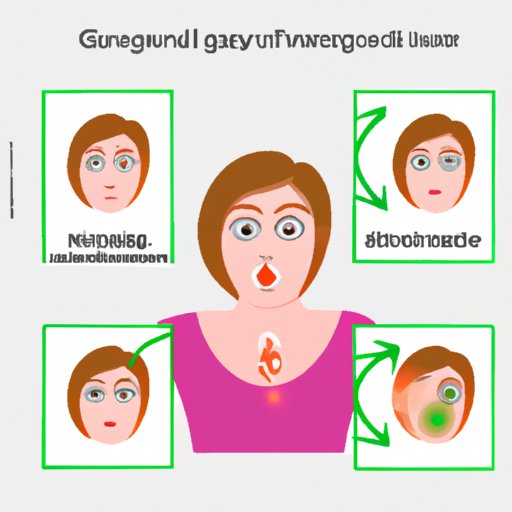
Introduction
Graves disease is an autoimmune disorder that affects the thyroid gland, leading to the overproduction of thyroid hormones. This condition can cause a range of symptoms that can impact a person’s daily life. Early detection, diagnosis, and treatment can help to manage the condition and reduce the risk of complications.
Why Recognizing Graves Disease is Important
It is essential to recognize the signs of Graves disease since early detection can help in the management of the condition. By seeking medical attention early, you can get an accurate diagnosis, which will allow your doctor to create an effective treatment plan. Effective treatment can help to manage the symptoms and reduce the risk of developing complications.
3 Symptoms of Graves Disease
Here are three of the most common symptoms of Graves disease:
1. Hyperthyroidism:
Hyperthyroidism occurs when there is an excess production of thyroid hormone. This can lead to a range of symptoms, including weight loss, insomnia, anxiety, irritability, heat intolerance, sweating, and irregular heartbeat. Even if you are not experiencing weight loss, experiencing one or more of these symptoms can be an indication of hyperthyroidism and may warrant medical attention.
2. Bulging Eyes:
Bulging eyes, also known as exophthalmos or proptosis, is a common symptom of Graves disease. This symptom occurs when the tissues behind the eyes swell, causing the eyes to move forward and appear larger. This can cause discomfort, dryness, and irritation in the eyes, as well as difficulty closing them. In severe cases, it can also cause vision problems.
3. Goiter:
A goiter is a swelling in the neck that occurs when the thyroid gland becomes enlarged. This can cause difficulty swallowing or breathing, discomfort in the neck, and an abnormal bulge. Although goiters can be caused by a range of conditions, they are often associated with Graves disease when hyperthyroidism is present.
Other Symptoms to Watch Out For
Other symptoms associated with Graves disease include fatigue, muscle weakness, tremors, and menstrual irregularities. In severe cases, individuals may experience heart problems, such as heart palpitations or atrial fibrillation, hypertension, or osteoporosis. However, since these symptoms can be related to other medical conditions, it is crucial to consult a health care professional for an accurate diagnosis.
Who is at Risk for Graves Disease?
Graves disease is more common in women than in men and is typically diagnosed in people between the ages of 30 and 50. A family history of thyroid disease, smoking, and a history of other autoimmune disorders can increase your risk of developing the condition.
The Importance of Seeking Medical Attention
If you are experiencing any of the symptoms mentioned above, it is crucial to seek medical attention. An accurate diagnosis can be made through a combination of medical history, physical examination, and laboratory tests. Your doctor may also perform imaging studies, such as an ultrasound or a thyroid scan, to evaluate the thyroid gland’s function. Appropriate treatment can then be recommended based on your specific needs.
Conclusion
Recognizing and understanding the symptoms of Graves disease is crucial to ensure an accurate diagnosis and effective management. If you are experiencing any of the symptoms mentioned in this article, seek medical attention promptly. Early diagnosis and treatment can help to manage the condition and reduce the risk of complications, allowing you to lead a healthy, fulfilling life.





